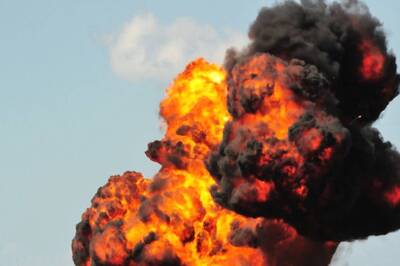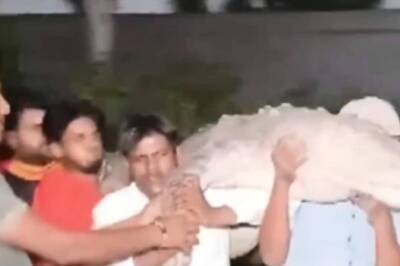
views
Pulwama: On July 27, a special police officer (SPO) Mudasir Ahmad Lone was repairing his motorcycle when three militants appeared in his courtyard. Within minutes, he was abducted.
The following morning when reporters reached Lone’s house, in South Kashmir’s Tral area, his traumatised mother made an emotional appeal to Lone’s abductors saying her son “had come home as he was going to resign from his job and would have announced it in the mosque after Friday prayers”.
Hareefa Begum, Lone’s mother, was flanked by her three daughters, and other relatives, all visibly shaken. Lone was her only son among four children, Begam said, begging for her son’s life.
Soon the video of her appeal went viral. In the meantime, militants also released Lone’s picture on social media confirming that they hadn’t killed him yet. Forces launched an operation to trace him.
It started in March last year. Militants crossed a line that had never been breached before. Gun-battles and revenge killings were for the first time brought inside the homes of security force personnel. A trend of abductions and killings of off-duty security personnel had started emerging.
Abducted soldiers have almost no chance of returning alive. In almost every case the worst has come true.
Against all odds, Hareefa Begum’s plea worked and Lone was set free by militants a day later on July 28. Still recovering from the distressing experience, Lone and his family refused to talk about it.
But militants soon showed that Lone’s case was only an exception.
Latest Killing
Hours after Lone’s release, less than twenty miles away in the same district, militants barged into the house of a CRPF jawan.
In Naira village of Pulwama, mosque loudspeakers were abuzz with the Aazan for Isha prayers (late night prayers). Naseer Ahmad, in his early thirties, and his wife, who is in her late twenties, were performing ablutions for the Namaz.
“Three gunmen suddenly entered into our house. Two were very young and had no beard on the face and one was with the long beard,” Naseer’s wife, Neelofar Jan recalled.
“They asked him to guide them through the lanes but I intervened and said he is not much familiar with area, let me guide you,” she said.
Naseer went with them but Neelofar followed.
“Barely stone’s throw away from their house, two of the gunmen held his arms and another aimed his gun at Naseer. But I jumped on him,” Neelofar recalls.
“They beat me with the butt of their gun. I resisted them and held my husband’s hand. One of them put his gun on my forehead and fired — just an inch away, in air. Then he fired on the ground close to my feet,” said Neelofar.
Neelofar fainted and the militants took Naseer a few steps ahead and shot him dead.
He was the seventh soldier from various Indian security forces deployed in the valley to have been abducted from his home and murdered by militant groups in Kashmir.
Last year three such killings took place.
“No one dared to come out for ten minutes,” recalled a neighbor. Nasser’s lifeless body was lying in a pool of blood. He was rushed to the hospital where doctors recovered ten bullets from his body, mostly from his chest. His wife is three months pregnant and he was the only breadwinner in his family.
“We were happy when he got the job. He was the only one employed in our home and our only hope,” says Mushtaq Ahmad, elder brother of Naseer, sitting in a room packed with relatives and acquaintances, who had come to meet the family in this hour of grief.
For last six years, Naseer was posted in Pulwama, five kilometers away from his home. Naseer had also served in Naxal hotbeds of Chhattisgarh and Maharashtra.
At CRPF’s 132 Battalion camp in Pulwama, a senior officer, whom Naseer used to report, expressed shock. “He was doing duty with our intelligence branch. It is a personal loss,” the officer told News18, adding that in his last meeting he asked Naseer “to be in touch even after his transfer. I knew he was doing a great job.”
Among the seven killed in as many months this year, four are police personnel, one is an army soldier and the latest Naseer is from the CRPF.
“All persons killed are from south Kashmir,” said a senior police officer not willing to be identified.
How it began
It was on March 8, 2017 when militants first barged into the house of a policeman, a deputy SP-rank official in Shopian in this case. The officer was not at his home so his family was threatened.
“Tell your son to quit the job or face consequences”.
In April 2017 an advisory was issued by police asking its field personnel, particularly those from south Kashmir, to avoid visiting home for the next “few months”.
This came after militants broke into the house of a policeman in Hajipora village of Shopian district. The cop was forced to announce his “dissociation” from the force on the public address system of a local mosque. The same night, in Lundoora, another village of Shopian district, militants ransacked the house of another policeman who was away on duty that night.
In August 2016, a month after Hizb commander Burhan Wani was killed in an encounter, posters surfaced at many places in South Kashmir, asking the local police to stop “troubling” those taking part in the protests. In December 2016, Zakir Musa, the chief of Al Qaeda’s Kashmir wing - Ansar Ghazwatul Hind, warned family members of policemen of dire consequences if they “continue to harass relatives of militants”.
"You (police) have committed a big mistake by harassing our families, by involving our families,” Musa said in a video. “If you touch our families, we will not spare your families. You think your families are in Jammu so they are safe. Even if your families are in Kanyakumari, we have the capacity to kill them there,” said Musa.
Lost soldiers
In May 2017, shockwaves were felt throughout the country after reports of militants abducting and killing a young Army officer, Lt Umar Fayaz, came out.
A resident of Kulgam, Fayaz had gone to attend his cousin’s wedding in Shopian, from where he was abducted by militants on 9 May. His bullet-riddled body was found next day.
In September 2017, militants barged into the house of Border Security forces (BSF) constable Mohammad Ramzan Parray at Hajin town of Bandipora district in north Kashmir.
Parray was dragged out from his home and shot dead.
Later in November, a Territorial Army soldier, Irfan Ahmad Dar (23), was found dead in an apple orchard about three kilometers from his home in Sazan village. Dar was on leave at home and had left his home in the evening. Police said, he was abducted and murdered by militants.
Last month, a police constable, Mohammad Salim Shah, was abducted by militants from his home in Muthalhama village of Kulgam district while he was on leave.
Next day he was found dead with multiple bullet injuries in nearby Qaimoh village.
Earlier in the same month, police constable Javeed Ahmad Dar was abducted from his house at Vehil in Shopian district and was killed by militants.
A month before that, in June, Army soldier Aurangzeb was abducted from a private vehicle while he was going home for Eid in Shopian. His body was recovered from a Pulwama village.
Militants also released a video of Aurangzeb, believed to have been shot moments before his killing.
In the video, he can be seen being interrogated by the militants about encounters in which he had participated.
A mounting concern
“Local boys have an organic link with security, we are taking all possible measures in this connection. The people involved in this have been brought to justice and the others will face the law,” a top police official of the state told News18.
To give an example, the senior official said, “The three militants, who were part of a group involved in the murder of a police constable Salim, were killed in an encounter by security forces in Khudwani village just a day later.”
Earlier, the militants would barge into the house of security personnel and vandalise property but now the concern has mounted as the militants are trying to create fear by killing our boys, another J&K police officer said, wishing to remain anonymous.
The security personnel have been asked to remain in contact with local police while they are on leave at home and contact immediately in case they are in any dangerous situation.
“We can’t provide security to everyone. But we are trying to work out different strategies to ensure our local security personnel are safe,” the officer said.
Difficult times ahead
Abdul Hameed (name changed) who hails from south Kashmir couldn’t attend the marriage ceremony of his niece. He has moved his family from south Kashmir to Srinagar. His children have been enrolled in the school in the city.
“The situation is bad. I have left my house. Even when I visit my parents in the village it is during the day,” says Hameed, who is serving in Special Operations Group of J&K Police.
Fearing trouble, some police personnel have relocated with their families to Jammu. The police officials have not revealed the number of such officers who have shifted away recently.
However, on condition of anonymity, police sources say that the number of police officers who have recently relocated is highest in last several years.
In 2016, when Burhan Wani was killed, people also set the house of some security men on fire. The condition, particularly in south Kashmir, is grim.
“We are living in complete fear. I have even stopped going to the mosque when I am home,” says another police constable in south Kashmir.
“Maybe the informers of militants will see me at that time and inform them.”
(The author is a freelance journalist)



















Comments
0 comment